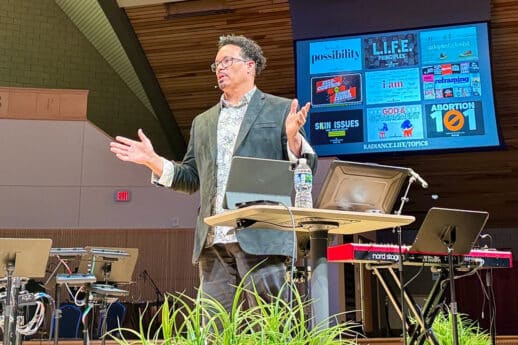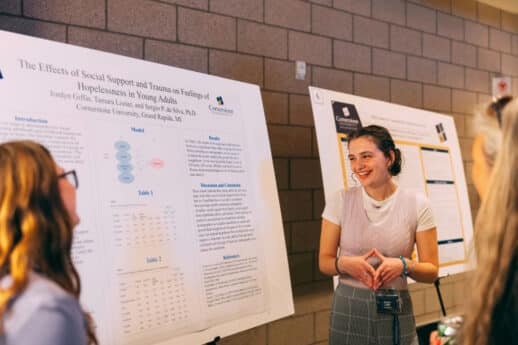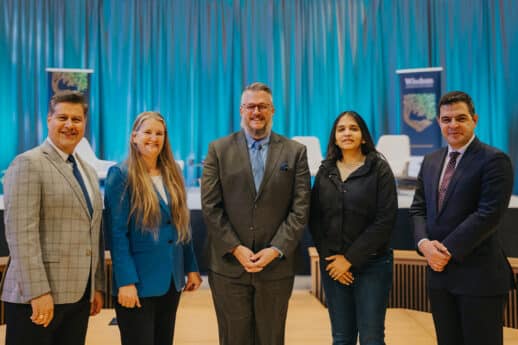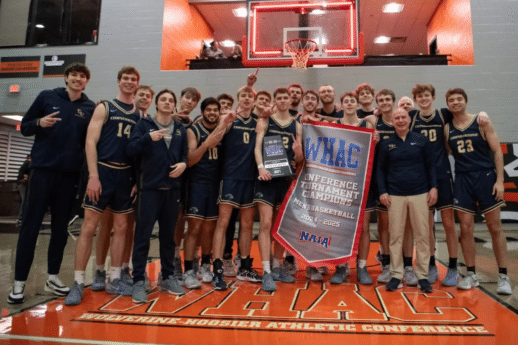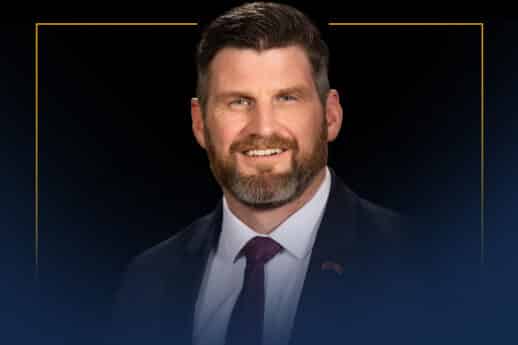Wisdom Conversations: Reconnecting in a Lonely World
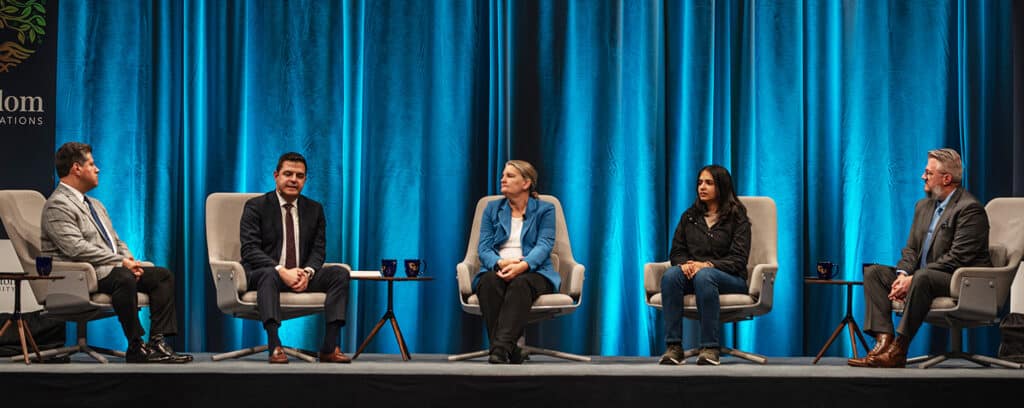
“I am thrilled that you are here tonight to join us for tonight’s Wisdom Conversations.” Senior student Cole Moore (’25), a Cornerstone University double major in ministry and Biblical studies, warmly greeted over 800 community and university guests to the 7th Wisdom Conversations — Lonely U.S.A: Our Loneliness Epidemic and How to Cure It.
Loneliness affects every individual and community and is one of the most serious national crises in America’s history. Distinguished national panelists offered their experienced and compassionate insights including: Dr. Jean Twenge, author and professor of psychology at San Diego State University; Chaitali Sinha, author and chief clinical R&D officer for Wysa; Dr. Mark Mayfield, founder of No Student Unseen, award-winning author, and national leadership coach; and Dr. Sohrab Ahmari, U.S. Editor of UnHerd, journalist, public intellectual, and author.
Cornerstone University President Gerson Moreno-Riaño moderated the evening’s exchange ranging from the roots of disconnection to the practical and spiritual solutions for building lasting community and human connection.
The Stigma of Loneliness in Modern Society
Noting that our culture often equates loneliness with personal failure which prevents people from seeking help, Dr. Moreno-Riaño asked the question “why the stigma around loneliness?”
The stigma surrounding loneliness often stems from shame and self-blame, explains Dr. Twenge: “I should have these relationships. Maybe it was my fault.” This sense of failure makes it difficult to open up. Twenge believes through extensive research, especially research focused on lonely teens, that humans are fundamentally not meant to be alone and that creating feelings of belonging and connections are essential.
Chaitali Sinha added that in faith communities, the challenge is compounded by the expectation that faith should eliminate loneliness. “I’m supposed to be better than this. I’m supposed to feel connected to everyone around me. So where’s the space to talk about disconnection?”
Also emphasizing the paradox of vulnerability, Dr. Mayfield’s trauma expertise is revealing. “If we admit that we’re lonely, we admit that we need to be vulnerable. And that is a scary place for many people,” he said. Choosing trusted individuals is essential to stop replicating repeated hurt from past hurts by others.
Technology’s Role in the Loneliness Epidemic
Dr. Ahmari suggests technology is a major driver of loneliness. He pointed out how social media and digital interactions can give a “pseudo or parasocial connection,” creating the illusion of engagement while actually deepening isolation.
He further says, “We are tempted to rationalize that the asocial, antisocial behaviors we engage in — like arguing online or seeking validation through likes — ” are actually making us feel connected and we are not.”
According to Dr. Twenge, the majority of Americans owned a smartphone by the end of 2012. “That was the tipping point,” she explained. “Teens are spending nearly five hours a day on social media, yet they report feeling lonelier than ever.”
Dr. Mayfield expands that technology is reshaping social skills. “We are seeing a generation that doesn’t know how to interact relationally and emotionally,” he observed. “The lack of face-to-face interaction has impaired their ability to read emotional cues.”
Aligned with Dr. Ahmari, Sinha highlighted the illusion of social media, noting, “We’ve replaced real community with curated snippets of life.”
Sinha developed a WYSA free mental health support app using chatbots to help users manage social anxiety and self-doubt, key barriers to connection. Research showed benefits across generations, including older adults facing deep isolation, demonstrating technology’s role in bridging disconnection.
Panelists agreed that the issue isn’t technology itself, but how it’s used.
Cultural and Generational Contributors to Loneliness
Loneliness is shaped by cultural, family and generational forces. Dr. Mayfield emphasized that humans are wired for connection. When we feel unseen or undervalued, it fuels anxiety, depression, and even suicide. He suggests that addressing the core needs to be seen and valued could dramatically reduce depression and suicide.
Dr. Twenge agrees. The dramatic rise in loneliness among teens correlates with a decline in face-to-face interactions. Once-common activities — hanging out, going to malls, or informal gatherings — have plummeted since 2012, mirroring increases in depression.
The dynamics of family life is also shifting. The modern delay in marriage and decline in birth rates have contributed to increased loneliness. Many young adults now navigate life without a primary emotional anchor.
Sinha adds that migration patterns play a role. “People move for jobs or education and suddenly find themselves disconnected from their roots, their culture, and their support systems. Loneliness often follows.”
The discussion highlighted that loneliness is not just about being alone — it’s a perception. Dr. Mayfield described it as “a state of being unseen or unnoticed.”
Dr. Twenge emphasized generational differences, noting that younger people struggle with social anxiety, while older adults often lack meaningful connections. Research shows that even digital tools helped bridge these gaps, showing that connection needs vary across age groups.
Another paradox was mentioned regarding The Atlantic’s “The Antisocial Century” is the growing preference for solitude. Solitude can be enjoyable for some, but loneliness is a psychological state with mental, physical and spiritual impacts according to Dr. Mayfield who cautioned that isolation carries serious health risks, affecting the heart, brain, and immune system. He urged further research into whether solitude harms well-being.
Dr. Ahmari and the panel find that shifting family structures and economic instability contribute to loneliness in measurable ways. Strengthening family bonds through intentional presence and stability remains crucial across generations.
Potential Solutions: Building a Culture of Connection
The panel offered solutions to reverse the epidemic and foster deeper connections, Dr. Twenge emphasized the need for policy changes, particularly in schools. “We need to create environments where socializing in person is the norm again. Something as simple as banning phone use during the school day can encourage face-to-face interactions.”
Dr. Mayfield encourages families to establish intentional connection points. “Create a family mission statement. Decide together how you want to interact with each other and with technology. Have tech-free times and engage in real conversations.”
Dr. Ahmari advocated for the restoration of Sabbath as a communal practice. “If we don’t make space for real relationships, technology and busyness will fill the void,” he noted.
Sinha also underscored the value of intergenerational relationships. “Incorporating grandparents and older mentors into everyday life can provide both wisdom and emotional support that many young people lack today. There is something deeply powerful about being rooted in the wisdom of those who have gone before us.”
Across these perspectives, the consensus was clear: reversing the loneliness epidemic requires a cultural shift — one that prioritizes real, meaningful connections over convenience and distraction.
Personal Responsibility: The Role of Virtues
Closing the discussion, Dr. Mayfield reinforced the power of persistence and character in building meaningful relationships. “We need to be persistent in reaching out to others, even when they push us away. Loneliness is defeated in the presence of deep, authentic relationships.”
Sinha encouraged openness. “When someone is struggling to articulate their loneliness, sharing our own experiences can help them find the words.”
Dr. Twenge suggests that “The antidote to loneliness isn’t necessarily large-scale change. Sometimes, it’s as simple as saying hello.”
The group shared a recognition that combating loneliness is not just a societal challenge — it is a personal responsibility. Cultivating virtues like courage, humility, and self-sacrificial love can transform relationships and communities.
Taking Action
Loneliness is a deeply human condition. The solution lies in intentional connection, communities of care, policy and the virtues that foster belonging according to Cornerstone’s distinguished guests.
Above all, we are called to love — a Christlike, self-giving love that seeks the unseen and restores communion. We must choose to see and serve one another through Christ-centered faith and intentional connectedness.
Cornerstone University thanks our guest panelists for their insights and the West Michigan community for engaging in these important conversations.
Register now for the next Wisdom Conversations on October 2: The Family: Strengthening and Healing the Fabric of Our Nation.
Wisdom Conversations is Cornerstone University’s signature Christian thought leadership series in West Michigan that has drawn over 4,000 attendees to address pressing issues of our time.
If you would like more information about Cornerstone University’s Wisdom Conversations or have interest in one of our 65 degree programs, contact us at wisdom.conversations@cornerstone.edu.





